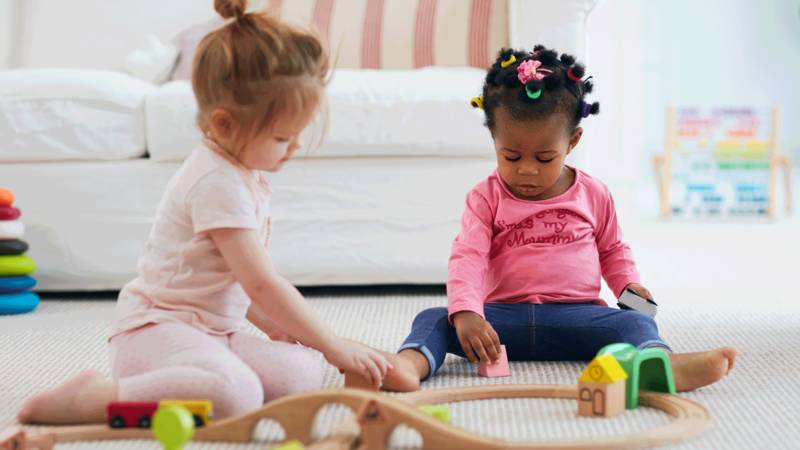How can I tell if my 2-year-old is gifted?


Rebecca Parlakian is ZERO TO THREE’s Senior Director of Programs at ZERO TO THREE, where she directs a portfolio…
A: It is hard to determine whether a 2-year-old is gifted because development in the early years unfolds unevenly. Some children may be quick to master language and counting, but slower to develop physical skills. Other children may be kicking balls and climbing trees, but not yet talking much. What’s most important at this age is to nurture your child’s love of learning by following his lead and interests.
It’s also important to be mindful of the fact that, even when young toddlers are quite advanced in an area like language, it is much less common for them to be ahead on the social-emotional front. This means they lack the self-control, attention, and listening skills for academic-centered classes or other very structured learning experiences. At this age, learning happens best through play.
What’s most important at this age is to nurture your child’s love of learning by following his lead and interests.
Rebecca Parlakian
To nurture your child’s unique strengths and abilities:
Follow their lead. See what excites them and delight in their discoveries. Look for ways to build on and extend their interests. For example, if your 18-month-old is fascinated by the icicles hanging off your roof, by all means don’t let them stand underneath them! Instead, break one off and let them explore it. Bring it inside and watch it melt. Make your own “icicles” (homemade popsicles). Float some ice cubes in the bath and play with those. See how they bounce and bob in the water and eventually melt. Repeated experiences like these that build on their interests and help children learn. They also ignite curiosity—a lifelong gift.
Encourage your child to take on new challenges. If they is building a tower with blocks, ask them about who lives in the tower and create a story together. You might also ask them about the building strategies: How did you get it to go up so high? Note the shapes of the blocks—squares, triangles, rectangles. If you have an older toddler, note the relationship of the blocks to one another; that is, discover how two square blocks, placed side by side, are the same length as a rectangle block. You can also offer blocks in a variety of shapes and sizes, or different-sized cardboard boxes to stack and construct with.
Show interest in your child’s and ideas. Encourage them to share their thoughts. Listen carefully and ask questions, starting with What, Who, and Where questions. As your child gets older (starting at about 2½), move to How and Why questions. This helps children learn to think through and expand on their ideas.
Be a pointer-outer. Snap pictures of a tree in the park each month of the year to watch it change. Photograph your puppy (or a new sibling!) each week to note similarities and differences over time. Plant seeds and watch them grow and change. Cook together and notice the transformation that happens as a collection of ingredients becomes a plate of cookies.
Take advantage of local activities. Bring your child to local parks, nature centers, library story hours, local museums, historic tours, and other enriching events. Many towns and cities have a wide range of free or low-cost activities that expand children’s horizons in endless ways. Even a simple trip to a recycling center or transfer station (most have hours they are open to the public) is a wonderland of new sights and sounds for small children.
The best childhood memories are not (usually) of singing the ABC song, but of spontaneous, delightful moments: Daydreaming, playing silly games, running through sprinklers, or digging for treasures in the sandbox.
Rebecca Parlakian
Help your child cope with and overcome obstacles. Model the language they can use when frustrated. Guide them through problem-solving techniques. Let them know it’s okay to ask for help. (Sometimes children who have been given the message that they are very clever and good at figuring things out by themselves have trouble asking for help.)
Create opportunities for your child to play with others and make friends. Social skills are as important as the ABC’s when it comes to nurturing a child’s overall healthy development.
Buyer beware. Many parents, especially those with quick learners, find themselves drawn to classes, DVDs, and toys that claim to make very young children smarter. However, there is no long-term research showing that these toys or learning experiences build brain power. Instead, look for toys that will build on your child’s interests and that nurture creativity and imagination (think blocks and pretend play props such as dress-up clothes and plastic food, etc.). Keep in mind that the more a toy does for your child, the less your child learns. (Often the most attractive toys with lots of bells and whistles are more entertainment than education.)
Most important, make sure your child has plenty of time to just be a kid. The best childhood memories are not (usually) of singing the ABC song, but of spontaneous, delightful moments: Daydreaming, playing silly games, running through sprinklers, or digging for treasures in the sandbox.
A version of this question first appeared in “Your Child’s Behavior,” a column written by ZERO TO THREE in American Baby magazine.
